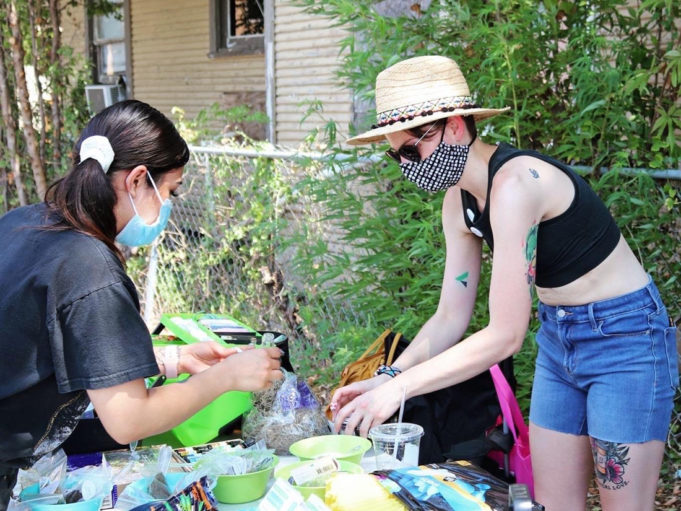For individuals living in poor and underserved Tarrant County communities, access to screenings for sexually transmitted infection (STI) was difficult before COVID-19 hit. To provide access to vital screenings for HIV, hepatitis C, and other transferable diseases, Tarrant County Public Health staff and a patchwork of nonprofits provide regular screenings through pop-up events, health clinics, and outreach programs.
Jen Sarduy (director at the reproductive justice group Re+Birth Equity Alliance) and Lizzie Maldonado (director at the drug overdose prevention nonprofit O.D. Aid) serve different missions but perform similar work by providing affordable disease screenings, information about infectious diseases, and other preventative services.
Last May, Sarduy and Maldonado began hearing feedback from clients and public health officials about a pullback in county STI tests due to COVID-19. Any cuts in already limited STI screenings could mean that an HIV or hepatitis C outbreak would go unrecorded and untreated and an individual could go years without knowing that they have the transmittable diseases, Sarduy said. To avert a potential health crisis, Sarduy and Maldonado recently created the Tested and Rested program to provide affordable STI screenings, directions on what to do in the event of a positive screening test result, blood glucose tests, free condoms, and other essential public health services.
Tested and Rested partners with local Black-owned businesses. The first STI screening event was held at The Dock Bookstore, and the second was at Black Coffee.
Those businesses, Sarduy said, “are in communities with the lowest level of care.”
Maldonado said the shift to providing services normally offered by the county has diverted important resources from her nonprofit.
“I’m glad we were able to identify this and respond to it,” she said. “Because we put the mechanisms in place, we feel responsible for continuing services through the gap in services. We did not plan for this to be half a year of our focus.”
In an email, a spokesperson for the county said that “Tarrant County Public Health maintained its STI testing readiness despite the impact of COVID-19. While the testing availability did not decrease, the number of visits from the public did. In comparing March 1, 2019, to August 31, 2019, and March 1, 2020, to August 31, 2020, there were 59% fewer tests requested from the public.”
A quick phone call to the Tarrant County Public Health Main Campus confirmed that the county has reduced STI testing due to COVID-19.
Weekly: When is the next STI pop-up test?
Campus operator: As of right now, due to COVID, they are no longer doing those. They are only working by appointment.
Which clinics are open?
The only one that’s open right now where they are doing this testing is here in Fort Worth near Rosedale [Street] and Main Street.
So were there other clinics open prior to COVID-19 for STI testing?
There was an Arlington one, but that one is closed.
Are pop-ups closed indefinitely because of COVID?
Yes, as of right now.
One possible explanation for the disconnect between the county’s statement and Maldonado and Sarduy’s observations is that the county is unaware of its reduction in public health services, even as the federal government has provided around $220 million to the county and Tarrant County Public Health through the Coronavirus Aid, Relief, and Economic Security Act (CARES) (see: “Cutting into Cares,” pg. 4).
“It shows a lack of care from the county,” Sarduy said. “The county is where [poor] people go for help, and they are not receiving help. When you look at our health care disparities, these are the first people who get cut off. For people who need these services, the fact that there isn’t any creates a hopeless feeling.”
Information on the county’s website shows that March had a robust STI testing lineup scheduled: March 3 (Tarrant County College’s Northeast Campus), March 7 (5201 Roberson Blvd.), March 24 (8201 Calmont Ave.), March 26 (TCC South Campus), and testing every Friday at the Resource Connection Building.
The county, Maldonado, and Sarduy do agree on one thing. Many people are scared to visit any clinic right now.
“We know that stay-at-home orders and fear also played a role, but [the county] grossly underestimated how much the scale-back of services impacted people,” Maldonado said.
Providing health care and preventative services in the age of COVID has become a potentially deadly affair. Texas recently surpassed 10,000 deaths due to COVID, and health care workers account for around 1,000 COVID-19-related deaths nationwide. Maldonado, Sarduy, and members of the Tested and Rested team have managed to stay safe while providing important STI screening services by offering drive-thru testing kit giveaways and walk-up screenings where the technicians rely on personal protective equipment and social distancing to stay safe.
“We won’t see the effects of these testing lapses until years later,” Maldonado said. “The multimillion-dollar government system was responsible for helping these people. I have questions for [the county] when it’s all over.”












